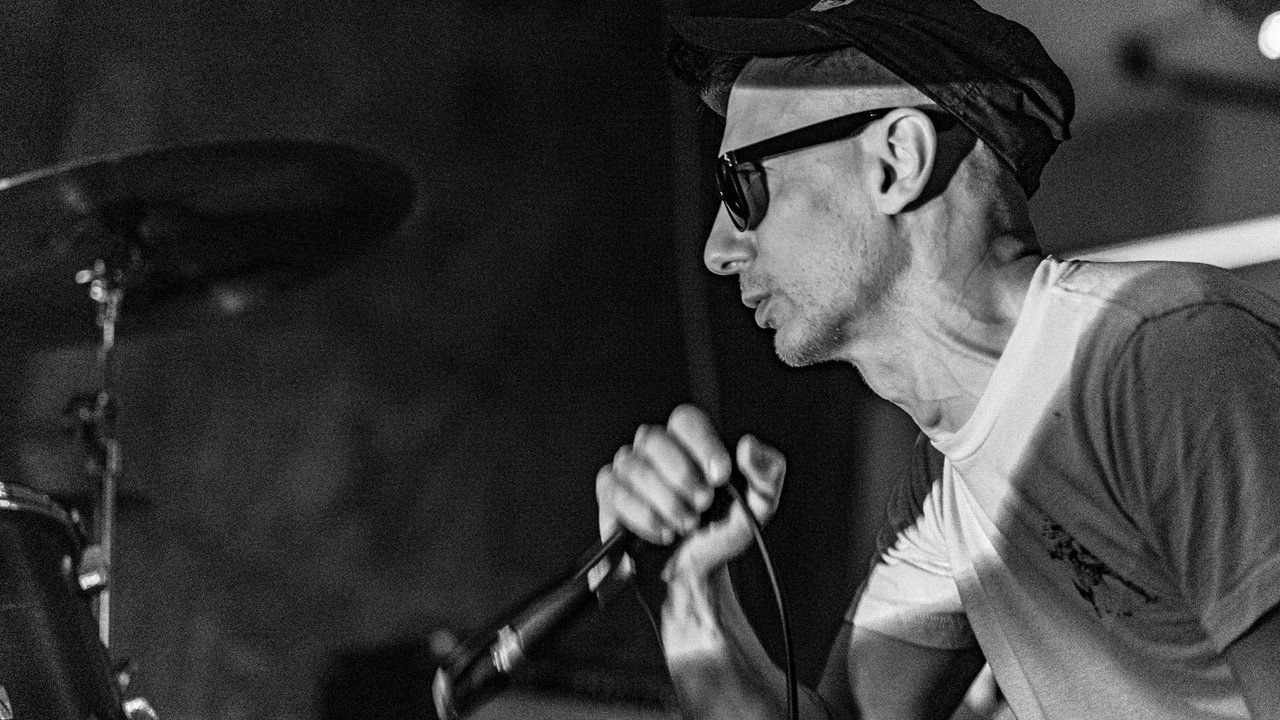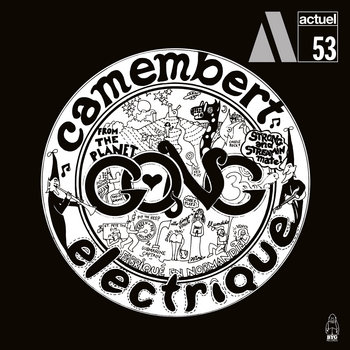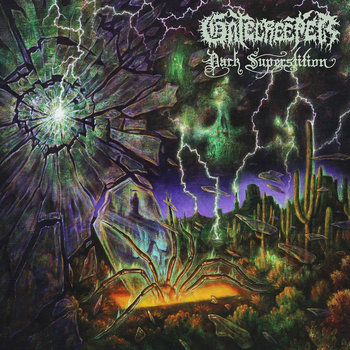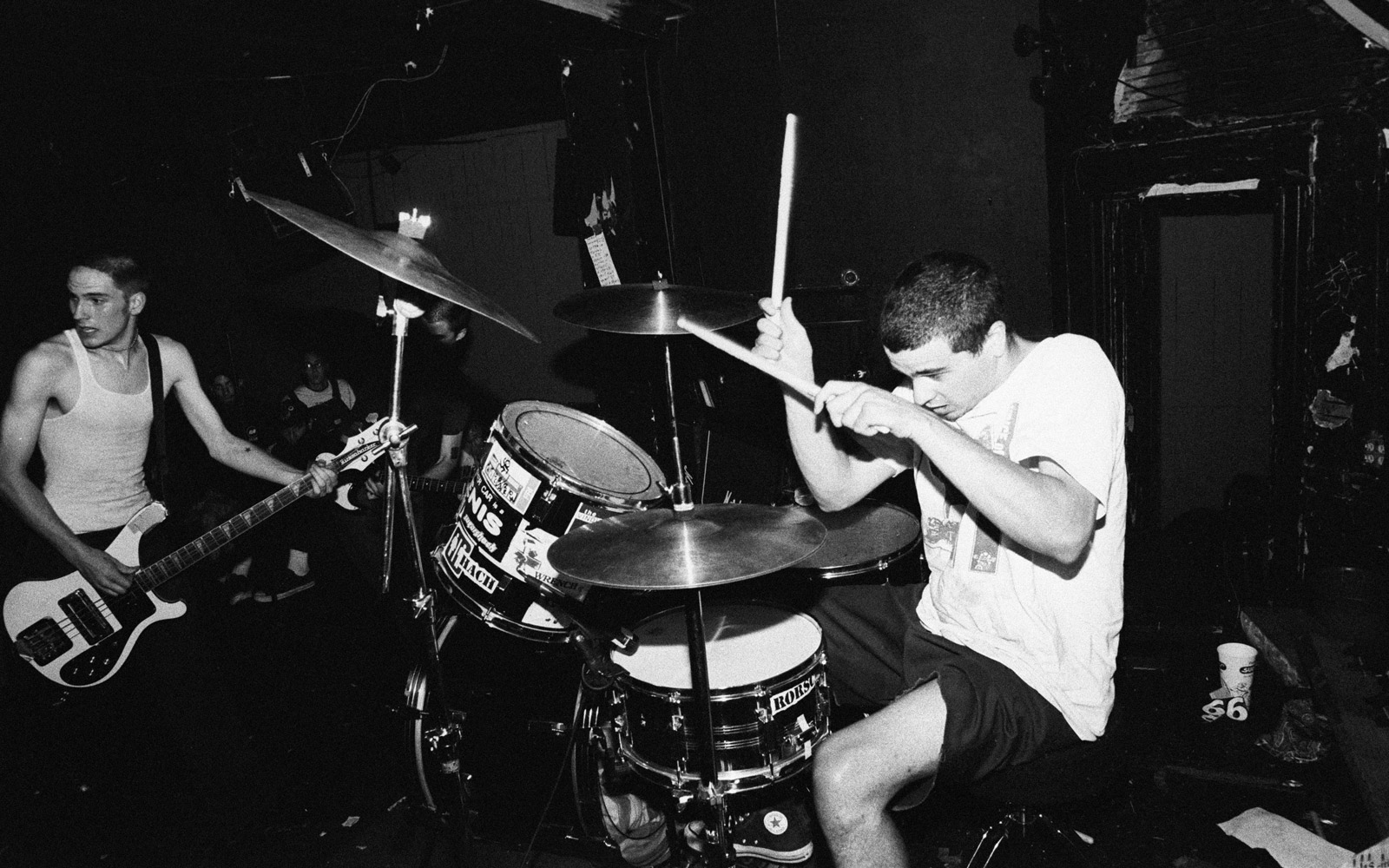
“Visible Distance” begins with a simple kick-snare pattern. But just as the groove gets going, it judders to a halt with a floor and rack tom slam. Again, it starts and stops, each pause letting in a brief glimpse of daylight. Suddenly, the band explodes into view, a mushroom cloud of noise blossoming skyward. Then the singer enters the frame—“This is your industry/ I will not let inside me, no/ I steered clear long and hard ago/ I wiped the slate clean/ As the whistle I hear/ Downtown/ Within a visible distance.” Less than a minute later the song ends as it began, with that austere opening beat—perfectly elliptical, like an apocalyptic haiku.

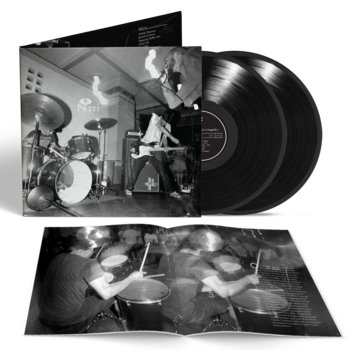


2 x Vinyl LP, T-Shirt/Shirt




Sitting in class at an elementary school in Annapolis, Maryland, home of the US Naval Academy, Colin Seven would gaze out the window and imagine a nuclear strike on the city center, decimating the surrounding landscape. Erupting from this environment in the early 1990s, Universal Order of Armageddon were masters of constantly sounding on the verge of collapse, a high-wire act that paid off when drummer Brooks Headley and bassist Anthony S. Malat locked into a pulverizing rhythm, or guitarist Tonie Joy unleashed a torrent of otherworldly notes and launched the quartet into inner space. UOA’s music is full of such contradictions—outwardly flailing yet intensely personal, violently explosive yet tightly controlled. On “Four Measure Start”, Seven addresses these contradictions: “Rules take time to break apart/ Just like living in a four-measure start/ Like missing things before your eyes/ Like loving things you despise.”
In its early days, this form of punk was called “chaotic hardcore.” That phrase could stand for a host of signifiers but, like any shorthand description, you knew it when you heard it. San Diego kingpins Antioch Arrow exemplified this style, their songs like exposed nerves scraping against barbed wire, all agitation and frantic movement. Assfactor 4 delivered similar thrills, channeling hardcore’s original innovations with 10 more years of rage and riffs tossed on the bonfire. In/Humanity came up with the self-flagellating term “emoviolence,” which made a certain kind of sense, and was good for a laugh or two. But Universal Order of Armageddon was not only the finest of this cohort, they could—along with compatriots Born Against—be considered the best hardcore band of the ‘90s. In this case, their abbreviated life span supports the argument; they flamed on brightly, burnt out quickly, and left a small but strong recorded legacy. The legend of UOA has continued to attract a steady stream of admirers, and now, Numero Group, which proclaims to present “the alternative history of popular music,” cements their stab at immortality with this thorough collection.


When Universal Order of Armageddon coalesced at the tail end of 1992, hardcore punk was at a strange crossroads. Nirvana’s popularity had exposed rock music’s previously obscured underbelly to the harsh glare of the mainstream media. All of a sudden, more ears than ever were looking for the next sonic thrill—the next supernova to blast them out of their personal black hole. Universal Order of Armageddon was a signpost for those in search of a sound that was not only new, but almost impossible to commodify. If you were interested in underground punk in the early ‘90s, your options were generally either jock jams masquerading as hardcore (see: the Victory Records catalog) or sophomoric power-pop with a vague relationship to first-wave punk (see: most of the Lookout! Records catalog). For those willing to take a gamble on something unclassifiable, even mysterious, there were Gravity Records and Universal Order of Armageddon (UOA). Based in San Diego, Gravity was the screamo ur-label, releasing many of the essential bands of the era (Heroin, Antioch Arrow, Unwound, Clikatat Ikatowi, Angel Hair, Mohinder). Even amongst this esteemed company, UOA distinguished itself.
But was UOA hardcore? Ask the members, and you’ll probably hear a resounding “No.” Which is fair, as an epic, churning track such as “Desperate Motion” has as much in common with Amon Düül II as it does Bad Brains. There aren’t many antecedents for UOA, which is one of the principal reasons they stand out so starkly. A mesmerizing, supercharged blur like “Painfully Obvious” has something of the magic dust that Saccharine Trust sprinkled on their gear, but it’s even more ferocious, indulging in a love of pure sound and energy. This is hardcore as free jazz, fire music for the grunge generation. As Joy says, “The sound of a distorted guitar spoke to me more than most humans communicating in the English language did, like an alien language only I understood.” On “Stepping Softly Into,” his playing seesaws between a primitive, wheedling hook and punishing riffs, while Seven pokes at macho archetypes and invokes nature like a post-punk Walt Whitman. “Clear Set” finds Headley conjuring Sunny Murray playing powerviolence. But UOA could still pen a catchy punk ripper, as evidenced by “Benedict” and “The Entire Vast Situation.” The extended dub-style workout “Longer, Stranger” was an attempt at “cinematic storytelling with the vibe of Apocalypse Now,” according to Joy. For “Desperate Motion,” it’s astonishing to find out that “the vocals were recorded in one take mere minutes after I finished writing the lyrics, so what you are hearing in that song is me reading what I wrote out loud for the very first time.” With his intense performance, it’s almost as if you are hearing Seven realize the truth and prescience of his words in real time, as he addresses the media, the listener, the whole damn planet.




2 x Vinyl LP, T-Shirt/Shirt




When Universal Order of Armageddon formed, the only member known outside of its local scene was Tonie Joy. He had spent years in Moss Icon, which had finally dissolved at the beginning of the decade following a frustrating off-and-on existence. Recorded in 1988, Moss Icon’s now-classic Lyburnum Wits End Liberation Fly wasn’t released until 1993, so UOA’s presence as Joy’s new band provided a double-shot of visionary punk. The old band’s growing reputation provided fuel for UOA’s radical reimagining of hardcore. Joy and Headley started jamming in the basement before Seven and Malat, who were distant cousins and musical collaborators in a project called From The Garden Of Orchid, joined. Malat was only 16 years old when they got together, but was years beyond in his playing abilities. When he was a teenager, Seven met Joy while reading poetry at an open mic, and the latter played a solo guitar piece. “After the show I walked over to him and somewhat brashly said something like—We should do our stuff at the same time someday, which is absolutely insane seeing as he was in Moss Icon at the time. He was polite about it, but probably forgot it happened minutes later.” From little seeds, a mighty oak grows.
Once established, UOA wasted no time in taking their noise on the road. Although the band only existed for 26 months, they toured the US extensively. “I am extremely thankful that I was able to see this country from coast to coast in the pre-internet/pre-homogenized big food chain rest-stop way,” Seven says. “Those long drives between loud clubs were punctuated by so many bizarrely cool and uniquely charming small-town diners, truck stops, and inadvertently—but no less totally mind-bending—”family fun” roadside attractions, most if not all of which have been wiped off the map in the name of what is considered progress. It was also nice to meet people in different cities who were doing amazing work with music and art and writing and all the things that mattered most to me. A standout moment was being given a tour of the artwork in Martin Sorrondeguy‘s family’s home outside of Chicago. The richness and depth of character in what they adorned their walls, along with the explanations of what the pieces meant to them and why it mattered, truly touched me.”

Another aspect that sets UOA apart is their visual aesthetic, as overseen by Joy. Using the tools of the time—photocopying, silkscreening, and cut-and-paste—there is an occult sensibility at play, echoing the project’s name. As per Numero Group’s usual high standards, the double album includes a 24-page booklet filled with lyrics, flyers, and graphics from Seven’s personal archive. A self-described “OCD packrat,” Seven also was in possession of the original multi-track tapes, so Joy and producer Chris Coady went into the studio and remixed the entire discography from the ground up.
While you can find evidence of their blisteringly intense performances on YouTube, complete with bodies careening about the stage (or basement floor), the new collection includes a live session recorded for venerable freeform radio station WFMU. The version of “Painfully Obvious” from this session could power a small city for a couple of decades. It originally appeared on the Kill Rock Stars compilation Rock Stars Kill, which led to a brief but notable relationship with the label. In addition to their releases on Kill Rock Stars and Gravity, Jade Tree and the Joy-operated Vermin Scum put out UOA’s initial run. Never fully satisfied with some of the releases’ sound quality, Numero’s collection rectifies decades-old concerns. Utilizing the talents of Coady, Dan Johnson, and Jessica Thompson, UOA’s catalog has been collected, remixed and remastered. Joy feels vindicated by the collection’s expanded sonic tapestry. “The mixes that were released in the ‘90s were never completely brought up to the level that we would have preferred due to a lack of money and time. Chris is one of my best old friends. He was listening to UOA when he was in high school in the mid-’90s before I met him, so it made sense that he should mix it. He actually made it sound better than any of us thought possible.”
Seven concurs, “I can tell you with absolute certainty that these Numero releases sound better than any of us could have ever dreamed. I think it will be an interesting treat for fans who are familiar with our catalog to hear the material with this new degree of clarity and depth, and I feel like it will be a great way for new listeners to hear our music for the first time.”
For every new listener, UOA’s old tagline remains as true as ever: Armageddon IS now.
The end of the world never sounded so good.




